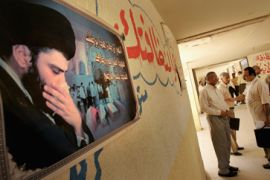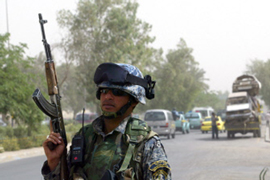Profile: Muqtada al-Sadr
The Shia leader aims to establish himself as a political and religious force in Iraq.

 |
| Al-Sadr’s love of computer games earned him the nickname Mullah Atari [GALLO/GETTY] |
Muqtada al-Sadr, of Lebanese ancestry, comes from a family of Shia scholars. He is the fourth son of the late Grand Ayatollah Mohammad Sadeq al-Sadr, a highly regarded scholar throughout the Shia Muslim world.
Mohammad Sadeq al-Sadr was murdered, along with two of his sons, allegedly by the government of Saddam Hussein – the former Iraqi president.
Al-Sadr is also the son-in-law of Grand Ayatollah Mohammad Baqir al-Sadr. Muqtada’s father-in-law was executed by the Iraqi authorities in 1980.
Al-Sadr’s cousin is Moussa as-Sadr, the Iranian-Lebanese founder of the Amal movement.
Despite his lineage and connections, he lacks the religious education and degrees required by Shia doctrine to take the title mujtahid (the equivalent of a senior religious scholar) and he lacks the authority to issue religious edicts (fatwas).
‘Mullah Atari’
Before his father’s assassination, al-Sadr studied in a seminary. According to Vali Nasr, a Shia scholar, he failed to finish his education and, as a student, was nicknamed “Mullah Atari” for his preference for video games over “the intricacies of Shia law and theology”.
Shortly after the US-led invasion of Iraq, al-Sadr spoke out against the Coalition Provisional Authority (CPA), led by Paul Bremer, a former director of reconstruction and humanitarian assistance.
He stated that he had more legitimacy than the US-appointed Iraqi Governing Council (IGC).
 |
| Al-Sadr’s Mahdi Army continue to battle US and Iraqi forces [AFP] |
In April 2003, his followers organised as the so-called Sadr Bureau and began providing services throughout Sadr City. The services ranged from health care to food and clean water.
Later in 2003, residents of Sadr City met in neighbourhood caucuses to elect neighbourhood councils, and ultimately a district council to represent the Sadr City district.
The Sadr Bureau, aided by armed Sadrists called the al-Mahdi Army, attempted to remove the new district council by force and occupied the district council hall for several weeks.
But US troops removed them and the elected council resumed its duties. Despite this, the Sadr Bureau and the Mahdi Army have continued to act within Sadr City almost unhindered by US and Iraqi forces.
Muqtada al-Sadr has continually criticised the US military presence in Iraq. He says that the primary purpose of the Mahdi Army is to restore stability to the country.
It is a common belief that al-Sadr wishes to create a theocracy in Iraq, although al-Sadr himself has on occasion stated that he wishes to create an “Islamic democracy”.
Al-Sadr mixes Iraqi nationalism and Shia religiosity, making him a figurehead for many of Iraq’s poor Shia Muslims.
His appeal to the poor and dispossessed accounts for much of his popularity, but some Iraqis support him as symbol of resistance to the unwanted US presence.
Political foray
Followers of al-Sadr stood for parliament as part of the United Iraqi Alliance bloc of Shia political groups in December 2005.
But in November 2006, al-Sadr declared a boycott of the Iraqi government in protest over a summit held by Nuri al-Maliki, the prime minister, and George Bush, the US president, in Jordan.
The boycott lasted for two months, with the Sadrists eventually returning to their positions.
In April 2007, al-Sadr called a rally in Najaf, demanding al-Maliki agree a timetable for withdrawal of US-led troops in Iraq.
Since then, sporadic clashes have continued in Iraq, between fighters loyal to al-Sadr and US and Iraqi forces. Hundreds of people have been killed, along with thousands injured.
The exact motives of al-Sadr’s movement remains unclear, but what is gaining clarity is the continued struggle for power launched by an increasingly influential religious party.
Al-Sadr reportedly moved to Qom, Iran in August 2008, after suspending the activities of his fighters.
Following a strong showing by his bloc in the 2010 parliamentry election, he returned to Najaf in January 2011.